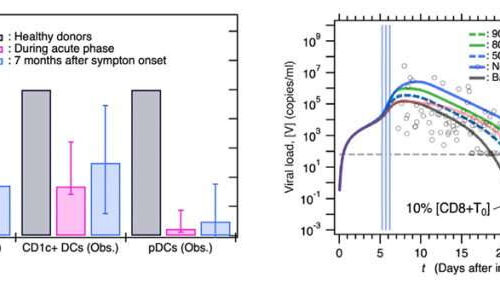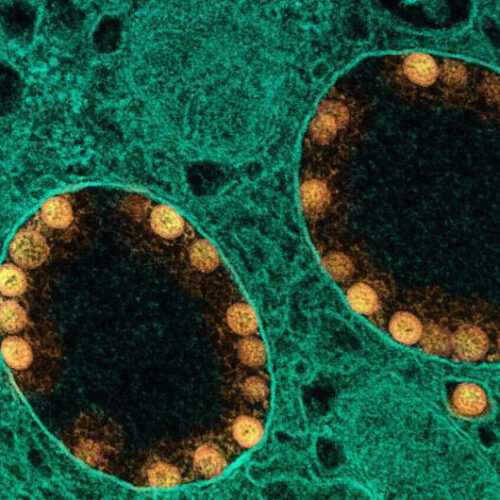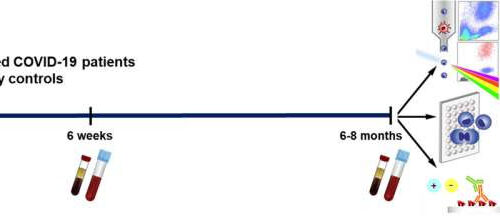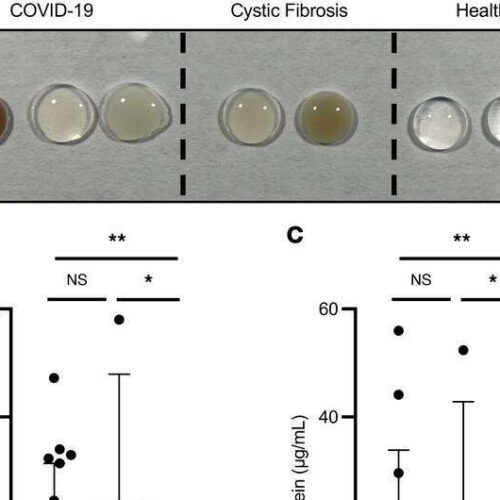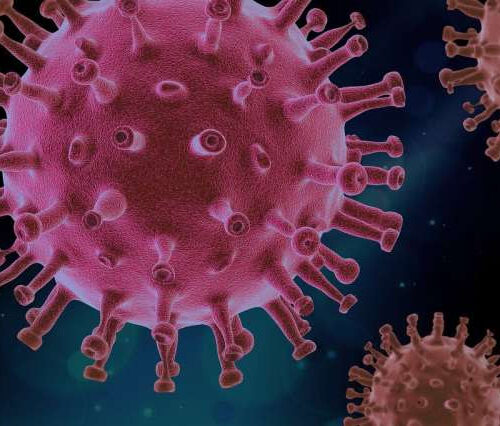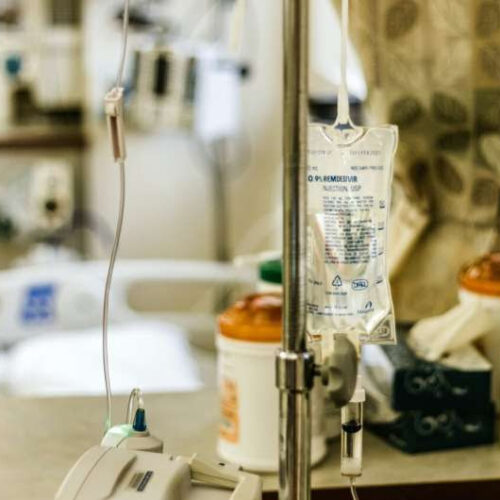by Okayama University Left: Proportion of DCs in healthy individuals, during acute COVID-19 infection, and 7 months after infection based on simulations and clinical observations (Obs). Right: Comparison of viral loads between the baseline model and the severe symptom models with varying conditions of antigen-reporting DC function (APC) or interferon levels. Credit: Okayama University As...
Tag: <span>severe COVID-19</span>
Severe COVID-19 may be caused by ‘senile’ interferon response in older patients
by Rockefeller University Press Transmission electron micrograph of SARS-CoV-2 virus particles (colored yellow) within the endosomes of a heavily infected nasal olfactory epithelial cell. Credit: NIAID Researchers in Germany have discovered that age-dependent impairments in antiviral interferon proteins underlie the increased susceptibility of older patients to severe COVID-19. The study, published today in the Journal of...
Severe COVID-19 impairs the immune system for longer than 6 months
by Linköping University Graphical outline of the study. Peripheral blood was collected from patients with COVID-19 that needed hospitalization (N=46) and healthy controls (N=31). Clinical parameters were measured at enrollment, and the levels and effects on peripheral immune cells and neutralizing antibodies were assessed at enrollment, 2 weeks, 6 weeks, and 6-8 months. The phenotype...
Scientists decipher the danger of gummy phlegm in severe COVID-19
by Bruce Goldman, Stanford University Medical Center Respiratory secretions from patients with COVID-19 are high in solids and protein compared with healthy controls. (A) Representative images of respiratory secretions collected from ventilated patients with COVID-19 are viscous and tenacious. Similar to CF samples, COVID-19 samples are often colored and opaque, whereas healthy samples are clear...
Blocking enzyme could hold the key to preventing, treating severe COVID-19
OHIO STATE UNIVERSITY COLUMBUS, Ohio – Blocking an immune response-related enzyme holds promise in preventing or treating severe COVID-19 symptoms by reducing inflammation, tissue injury and blood clots in the lungs, new research in mice suggests. Scientists who have long studied this molecule’s functions in bacterial infections traced development of extensive lung damage in infected...
High BMI in upper teens a risk factor for severe COVID-19
UNIVERSITY OF GOTHENBURG IMAGE: JOSEFINA ROBERTSON AND MARIA ÅBERG, SAHLGRENSKA ACADEMY, UNIVERSITY OF GOTHENBURG. CREDIT: PHOTO BY MARTA LASKOWSKI AND JOHAN WINGBORG Men with a high body mass index (BMI) in their upper teens had an elevated risk of severe COVID-19, requiring hospitalization, later in life, University of Gothenburg researchers show in a register study....
Those at highest risk for severe COVID-19 often least likely to get monoclonal antibodies
by Harvard T.H. Chan School of Public Health Credit: Pixabay/CC0 Public Domain People over age 65 at the highest risk for severe COVID-19 have often been the least likely to receive monoclonal antibodies (mAbs)—a highly effective treatment for the disease—both across and within U.S. states, according to new research co-authored by researchers from Harvard T.H....
Brain damage markers greater in people with severe COVID-19 than those with Alzheimer’s
Healthcare worker Demetra Ransom comforts a person with COVID-19 at United Memorial Medical Center in Houston, Texas, on December 4, 2020. MARK FELIX/Getty Images A study demonstrated that participants hospitalized with COVID-19 experiencing neurological complications had higher levels of blood proteins or biomarkers associated with neurological damage than people with Alzheimer’s. Increased biomarker levels correlated...
Three days of remdesivir cuts risk for severe COVID-19 in outpatients
Credit: Unsplash/CC0 Public Domain A three-day course of remdesivir results in a lower risk for hospitalization or death compered with placebo among nonhospitalized patients at high risk for COVID-19 progression, according to a study published online Dec. 22 in the New England Journal of Medicine. Robert L. Gottlieb, M.D., Ph.D., from the Baylor University Medical Center...
A common risk factor for Alzheimer’s disease may predispose carriers to severe COVID-19
by University of Helsinki Credit: Pixabay/CC0 Public Domain A study conducted at the University of Helsinki and the Helsinki University Hospital (HUS) suggests that the APOE4 allele may also increase cerebral microhaemorrhages related to COVID-19 and associate with mental fatigue related to long COVID. Roughly one-third of Finns carry the APOE4 allele, a genetic variant that...
- 1
- 2

